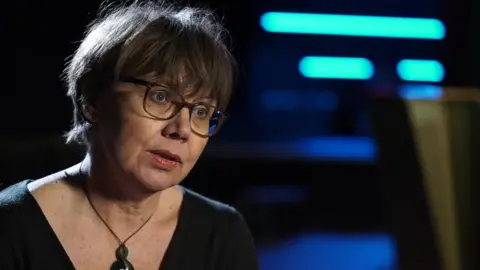Concert ticket resellers ordered to disclose fees
 Getty Images
Getty ImagesThe UK's four main secondary ticketing agencies have been banned from using certain "misleading" price strategies.
The Advertising Standards Authority (ASA) said they had not been clear enough about extra fees added at the end of the booking.
The four largest sites are Get Me In, Viagogo, StubHub and Seatwave.
Such firms have attracted increasing criticism and last month Google changed the way the sites are listed after pressure from Ed Sheeran's manager.
Secondary ticketing sites are designed to re-sell tickets to concerts, shows and events where the original buyer can no longer attend.
'Frustration'
The ASA's move is the latest in a string of actions taken against businesses who have been accused of misleading fans by claiming that they are official sellers of tickets, over-charging buyers or selling tickets that are invalid if they are re-sold.
Websites must now make the total ticket price, the VAT-inclusive booking fee and the delivery fee clear from the start.
The ASA has also banned Viagogo from claiming that it is an "official site" after it misleadingly implied it was an official primary ticket outlet rather than a second-hand ticket website.
 Getty Images
Getty ImagesViagogo is also banned from offering a "100% Guarantee" claim which the ASA said misleadingly suggested that consumers were guaranteed entry.
The ASA's chief executive, Guy Parker, said: "Many of us will recognise the frustration of being happy with the initial price of tickets on a secondary website only to be stung by hefty fees when we come to book.
"The message from our rulings is simple and it's clear: The price you see at the start should be the price you pay at the end."
'Developing transparency'
A StubHub spokeswoman said: "As a consumer-first ticket marketplace, StubHub supports any measures which make ticket buying easier, more convenient and more transparent for fans."
It said it would be "fully compliant" with its decision.

Case study: 'I went from elation to complete panic'
Claire Turnham had decided to arrange something special for her children to mark a number of significant birthdays.
"I had this idea because it was my 50th, my son's 16th, my youngest daughter's 13th and my middle daughter's 21st that I would surprise them all with these amazing tickets for Ed Sheeran," she said.

After researching how much the tickets would cost, Ms Turnham went on Google: "I just saw tickets available and so I naturally clicked on it through the advert at the top of the search engine and typed in four tickets.
"There was a lot of pressure," she recalls. "It said 'last four tickets' and I genuinely believed that I was buying the last four tickets and so I was really, really excited."
She said that the four tickets on the secondary ticket selling site Viagogo came to £263, which she said was around the price she expected to pay.
"So I clicked buy and I went from that feeling of elation and joy to suddenly complete panic because what actually flashed up was the total cost was £1,421.
"I didn't consent to that at all and in fact I didn't have that much money in my bank account so I went then into sheer panic mode."
As a single parent, Ms Turnham said she is very conscious about spending money but discovered that she could not cancel the transaction with her bank because it was a "pending payment".
Luckily, a friend stepped in to help out financially to give Ms Turnham time to claw back the money from Viagogo.
As a result of her experience, Ms Turnham started a group called Victim of Viagogo to help other people out who suffered the same fate as her.
She said: "The amazing thing is we're now up to £250,000 in refunds which is a massive, massive amount."

A spokeswoman for Ticketmaster, which owns Seatwave and GetMeIn, said: "We will continue to work with both the ASA and the CMA to further develop levels of transparency and consumer protection within the UK ticketing sector."
Last November, the competition watchdog, the Competition and Markets Authority (CMA), said it would take action against such ticketing websites suspected of breaking consumer law.
Last year, Ed Sheeran's promoter, Stuart Galbraith, asked Google to change how it listed secondary sites after Viagogo had paid to be listed top of the Google search, and said wrongly that it was an "official" seller of the singer's tickets.
Research by the campaign group FanFair Alliance showed that in 77% of searches for popular artists, a secondary website had paid to be top of the Google search result.
